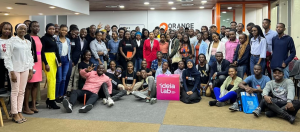Right at the start of the interview with Zachariah George, Managing Partner and co-founder of Launch Africa and one of Africa’s leading Angel Investors, it becomes clear that we are dealing with a busy man. Zach (as he prefers to be called) answers the phone while he’s driving his car (of course calling hands-free), and having arrived at his home, he quickly attends to his 8-year old daughter (he’s a single parent) and replies to a couple of urgent emails. This aligns with Zach’s philosophy of overcommunicating. ‘In order to be able to truly connect with your partners and stakeholders, err on the side of overcommunicating’. “Don’t be a slave to your phone, but when possible, always reply to an email within 48 hours. People think investors are arrogant and tough to please, but in reality, all they need is to be acknowledged and respected.” In addition to this, Zach always tries to meet his investor partners, portfolio company founders or venture ecosystem players in person, looking for common interests. “Because I have a big love for music and sport, when people come to Cape Town I often take them to live music gigs or for a game of tennis. We talk about music, art, sport, travel, about life. This is an important part in building a human side to business relationships”.
Business before politics
It is striking to see how Zach values building relations. “The world can be a divided place because of things like religion, politics, race and belief systems. On the other hand, what tends to bring people together are things like music, art, culture, food, family and sport. When I meet people I always look at what brings us together. I love discussing music, art, culture, food, family and sport, and less about religion, politics and belief systems. Similarly, when I speak with founders, before I even look at a financial projection spreadsheet, I talk to them about what their passions and interests outside of work are, and what keeps them excited. It’s all about relationships.”. Zach says that thanks to his very multicultural background (Indian, Tanzanian and Persian heritage) and having lived and worked in the Middle East, Asia, North America and Africa , he is very well able to relate to entrepreneurs.
Just be significant
This focus on relationships and common interests, however, hadn’t always been top-priority for Zach. At the age of 22, post his Master’s degree at Stanford, he started working on Wall Street, for Lehman Brothers. Indeed, the bank infamous for the 2008 financial crisis. When talking about the financial crisis at Lehman, Zach describes this as one of the most difficult moments of his life. “Most of us middle-class, university-educated folks think we can never be brainwashed”. But the toxic culture of alpha-males, money, power, fame, and eventually the collapse of the bank made him rethink his life. Zach started to realize that life is more than just the pursuit of success. He decided not to go back into the banking sector, and rather chose to align his heart with his head after a 6-week voluntary sabbatical he took in mid-2018 spending time helping out at an orphanage and a hospital in rural Ghana . From this moment on he didn’t just want to be successful, but more importantly, he wanted to be significant. “Anyone can be successful. The world has millions of millionaires. They are successful, but often they aren’t significant. That is what I realized after the crash, you need to be significant in what you do. Whatever you do, build something that lasts beyond you. And leave a legacy”.
Empires collapse, while ecosystems continue
When asked about his view on the relation between an entrepreneur and an investor, Zach has a very clear vision. One thing that is very important is a respectful, reciprocal relationship. “The moment you start treating an investor as an ATM, they will turn away”. There are a few things entrepreneurs should take in account when approaching an investor. One is that an entrepreneur should not only be able to tell what they are doing, but also why they do it. Secondly, he is looking for entrepreneurs who are “mentorable and coachable”. Meaning that when you give away your equity to someone else, you have to be humble enough to be mentored. Thirdly it is important for an entrepreneur to do research on their investors. Ask yourself how you can add value to the investors’ fund, make sure you are aware of the portfolio companies of the investors, and show effort! In the conversation it became clear that Zach is not looking for a quick and easy way. “I’m looking at entrepreneurs who are building ecosystems, not empires. Empires collapse, while ecosystems continue”.
Big five
Since we had the opportunity, we took our chance and asked Zach if he had some tips or advice for Angel Investment Networks. Of course Zach wouldn’t be Zach if he didn’t already have a list of tips! Beginning with the advice for early Angel Investors to stick to your lane, and stick to the geography that you are familiar with in order to add value beyond just money. The second advice he’d give to these Angel Investors is to be patient: “you want to tranche your investments over a period of time because you want to account for market cyclicality.” Thirdly, syndicates make due diligence easier. As an Angel Investor it can be difficult to conduct due diligence. By investing in syndicates, and being a part of a group where you have people with varying expertise, this can be made easier. The fourth advice, add value to your portfolio, but don’t let startups become dependent. “As an Angel Investor you want to open doors to founders as quickly as you can and then sit back and help where you can, but not at the beck and call of the founder”. Lastly, as an Angel Investor, it is important to know when and how to get out. For example when startups have met certain KPIs, this could be a moment for Angel Investors to get out via secondaries.
See you in Luanda!
If there weren’t any deadlines this day, we could have talked for hours more. We thanked Zach for his time, and after this interview, we are even more excited to welcome him as one of our keynote speakers on the Angel Investment for Social Good conference in Luanda!





